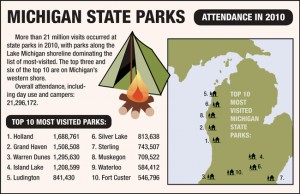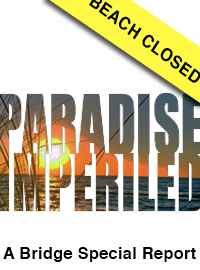$340 million bill looms over state parks
State parks in Michigan are facing a long road to recovery, even with new funding sources
On a mild winter morning in March 2009, prison inmates working at Ludington State Park discovered that part of the roof at the park’s popular Great Lakes Visitor Center had collapsed.
A hard winter, which dumped 130 inches of snow on Ludington, proved to be too much for the aging building. The weight of the snow brought down a 20 foot by 40 foot section of the roof.
State officials kept the building closed as they evaluated what to do. It remains closed to this day -- and won’t be reopened.
The reason: The state Department of Natural Resources doesn’t have the money to repair the roof. Instead, the DNR moved the Great Lakes Visitor Center displays to the park’s beach house.
The roof collapse was a striking example of the myriad problems facing Michigan’s state parks. Yet it wasn’t the most serious problem at Ludington State Park, which is known as “The Queen of the State Parks.”
The water system at the park, which provides water for drinking and bathrooms, is in danger of failing, said Harold Herta, chief of the DNR’s Resource Management Section, which oversees Michigan’s 99 state parks.
“The water system at Ludington is in very poor condition; pipes break often,” Herta said. “You can’t see the problem but it’s critical -- Ludington is one of our most popular parks and we don’t want to see it go off the grid.”
Water at the park is safe to drink, but Herta said there is an urgent need to replace the entire water system. That project will cost $936,000, according to state records.
The DNR has a $341 million backlog of critical infrastructure needs at Michigan’s state parks. Needs range from road repairs and modern electrical hookups to new bathrooms, fishing piers and water systems.
“We’re one crisis away from closing parks,” said Rebecca Humphries, who was DNR director from 2006 to 2010 and worked for the agency for three decades.
Humphries said the Legislature’s disinvestment in state parks was devastating to a parks system that was once hailed as the nation’s best.
The Legislature hasn’t provided general fund support for Michigan’s state parks since 2004. Funds previously used for state parks were diverted to other programs, leaving the parks to survive on diminishing revenue from entrance fees.
Funding for the parks has increased this year, due to revenue coming in from the state’s new Recreation Passport program.
(See a list of all the needs of Michigan state parks at: http://www.ourmichiganparks.org/tag/infrastructure-needs).
The Michigan Natural Resources Trust Fund, which recently reached its revenue cap, also will begin funneling money to the parks system. Those two revenue streams will provide $12 million for infrastructure improvements in fiscal 2012, Herta said. But with a $341 million backlog of work, the DNR won’t be able to make all of the necessary repairs anytime soon.
“If you do the math, you can see that it’s going to take awhile.” Herta said.
The Natural Resources Trust Fund receives money from royalties that oil and gas drillers pay the state. It then issues grants for parks and recreation projects across Michigan. The MNRTF reached its constitutionally mandated limit of $500 million in revenue this year, which means that new revenue will go into Michigan's State Park Endowment Fund. That fund will be used to help alleviate the $341 million backlog of infrastructure work needed in the parks.
Beyond fixing aging water systems and crumbling roads, the DNR needs to modernize many state parks to accommodate modern RVs and campers who expect services like wireless Internet. “These modern RVs need 50-amp service and none of our electrical systems were designed for that kind of draw,” Herta said. “Most of our systems were built in the 1960s, when 20-amp service was enough for people who wanted to plug in a trouble light.”
 Gov. Rick Snyder will soon appoint a special commission on state parks, said Bill Rustem, a senior adviser to the governor.
Gov. Rick Snyder will soon appoint a special commission on state parks, said Bill Rustem, a senior adviser to the governor.
Rustem declined to discuss specifics about the panel, other than to say its first job will be to study what needs to be done to modernize the parks and assess what equipment and services are needed to make the parks attractive to current and future generations of campers, many of whom drive high-tech RVs (which require long parking spots and 50 amp electrical hook-ups) and expect such things as wireless Internet wherever they camp.
“We need to look at the future of our state parks and how to make them attractive for current and future generations,” Rustem said.
See what new members are saying about why they donated to Bridge Michigan:
- “In order for this information to be accurate and unbiased it must be underwritten by its readers, not by special interests.” - Larry S.
- “Not many other media sources report on the topics Bridge does.” - Susan B.
- “Your journalism is outstanding and rare these days.” - Mark S.
If you want to ensure the future of nonpartisan, nonprofit Michigan journalism, please become a member today. You, too, will be asked why you donated and maybe we'll feature your quote next time!


